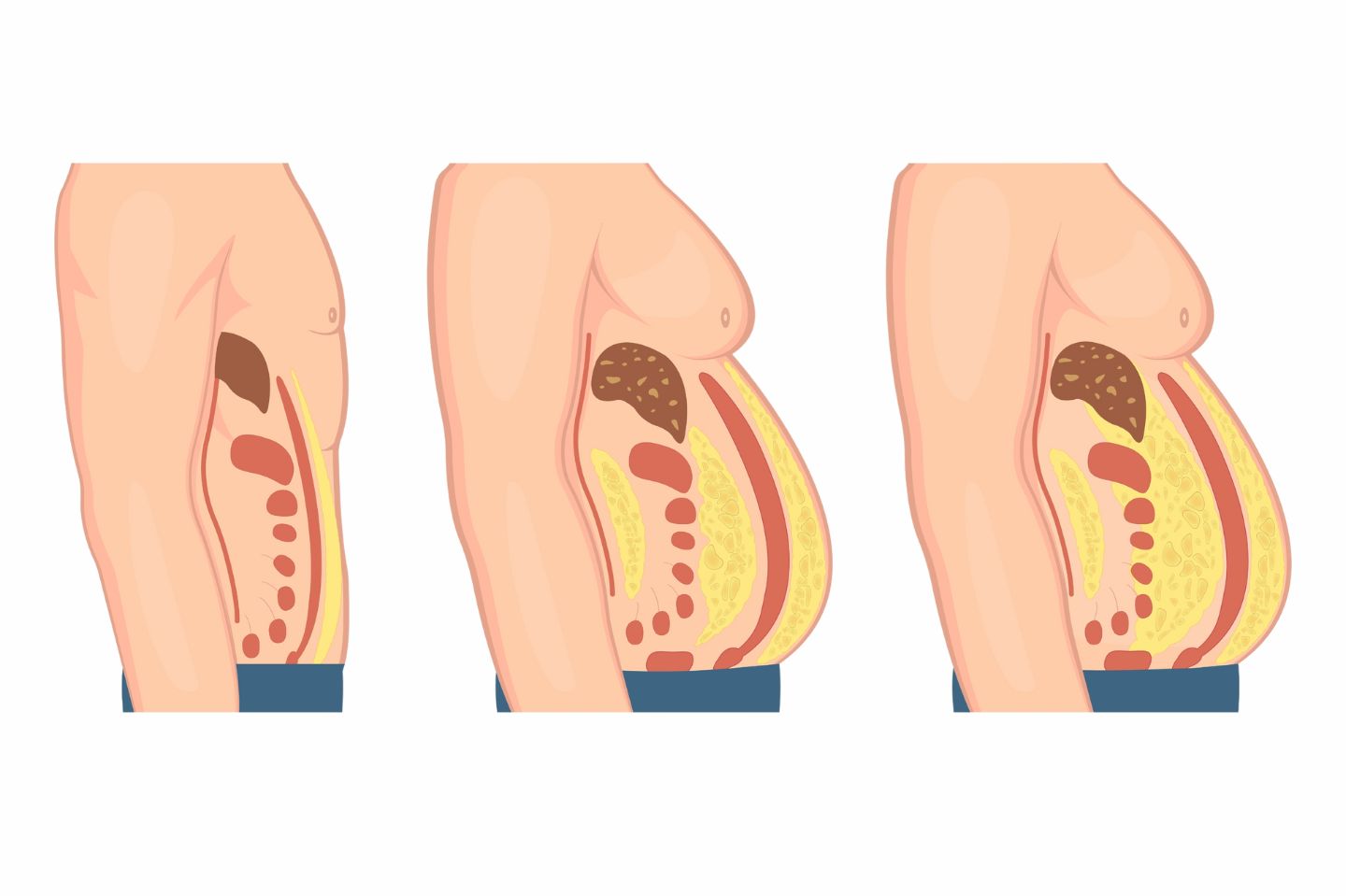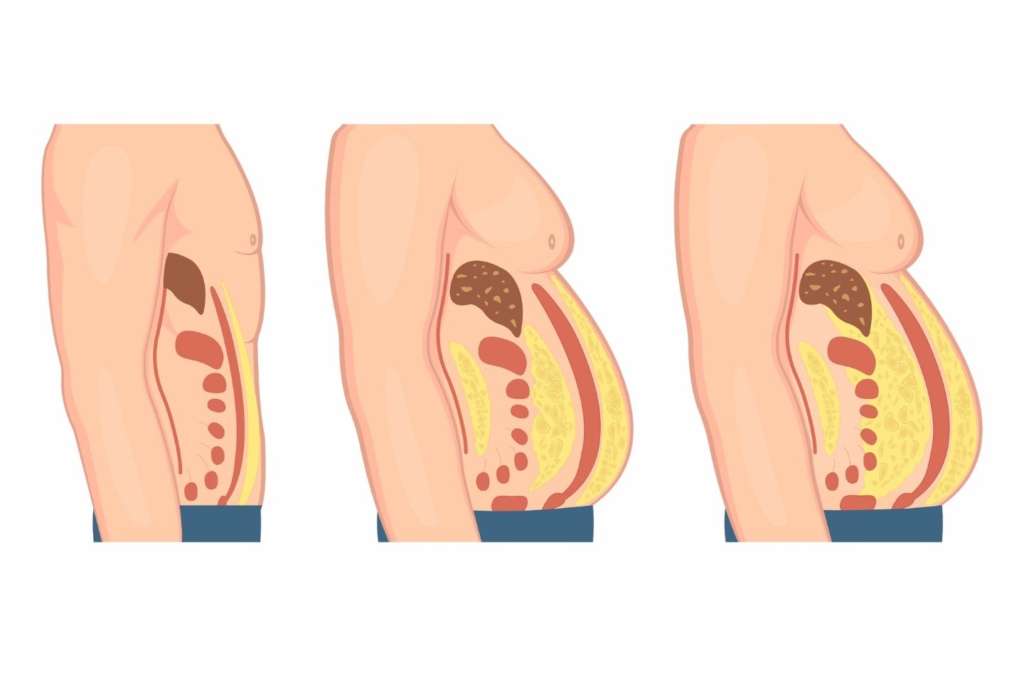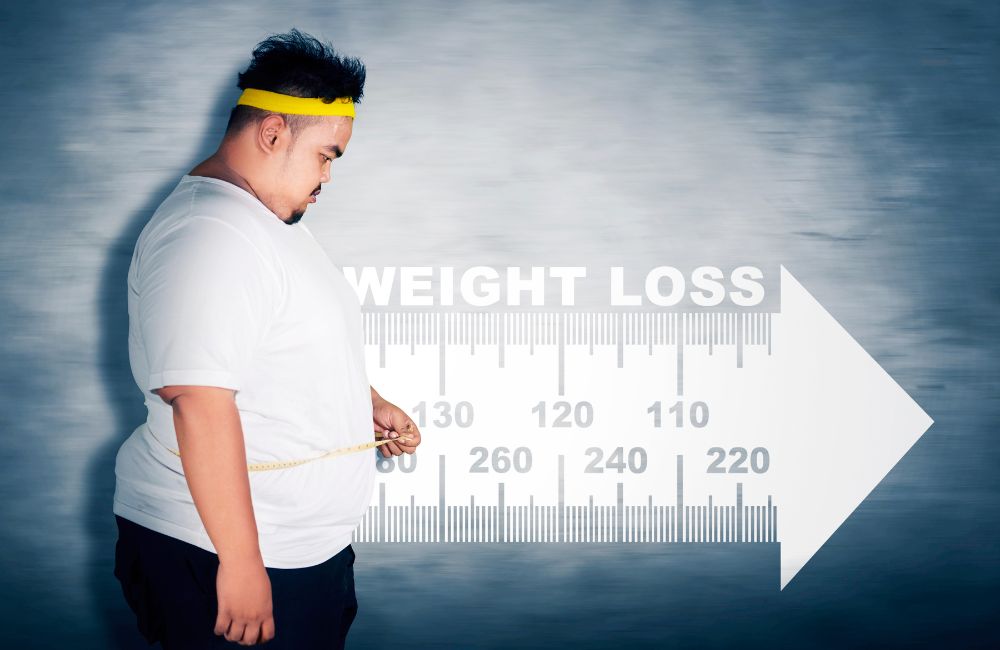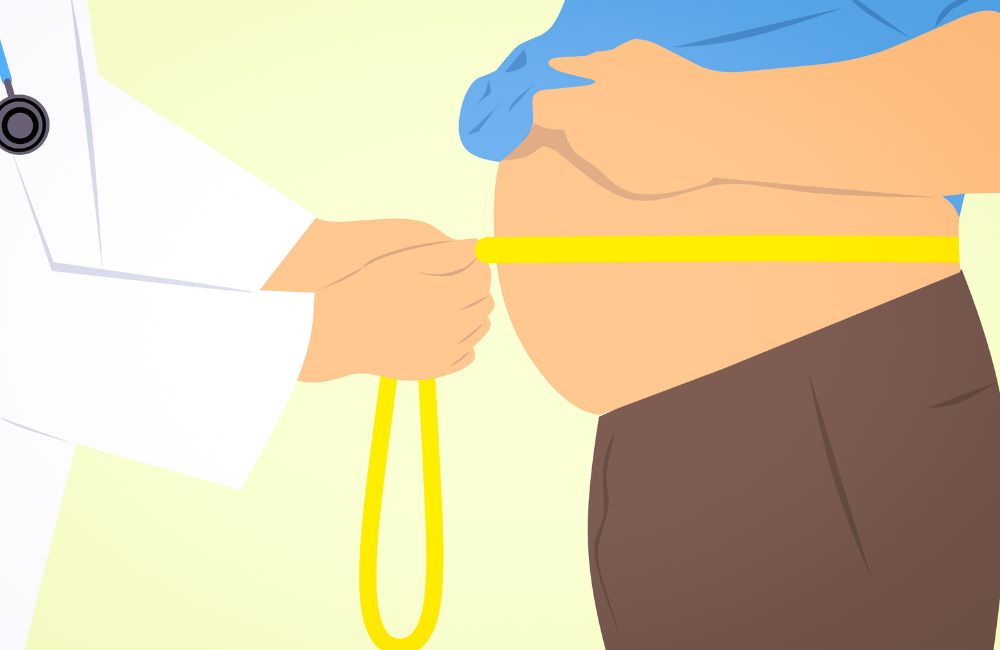
Stubborn belly fat got you down? You’re not alone! But did you know there are two main culprits hiding under your skin?
Understanding the different types of belly fat is key to tackling it effectively. Visceral fat, deep within your abdomen, surrounds your organs and can be a health risk. Subcutaneous fat, on the other hand, is the pinchable kind that sits just under the skin.
Both types contribute to that unwanted bulge, but they have different health implications.
In the next section, we’ll explore 10 factors that can contribute to the development of excess belly fat, helping you understand the root causes and take control of your health!
The 10 Habits Blocking Your Flat Belly (and How to Break Them)

You’re Drinking Sugary Drinks
A diet high in added sugars may lead to excess abdominal fat.
Studies show that added sugar has uniquely harmful effects on metabolic health.
Numerous studies have indicated that excess sugar, mostly due to the large amounts of fructose, can lead to fat building up around your abdomen and liver.
Although in moderate amounts fructose and glucose are important for your health, excess amounts can contribute to that stomach fat that persists.
The best way to help your body lose belly fat is to choose healthier drinking options such as:
- water
- infused water (water with chunks of vegetables or fruits to flavor water)
- black coffee
- unsweetened tea.
Not Eating Whole Foods
If you are relying on packaged and highly processed foods you are not eating whole foods, simple as that.
Staying away from fast foods, colorful and sugary cereals, candy, pastries, and cakes is a step toward eating whole foods.
The closer your foods are to their natural state the healthier and more wholesome they are.
When at home and eating out, aim to eat whole grains which contribute complex carbohydrates to your diet.
These carbs are essential to your body and brain functions.
They also provide fibers that help regulate all other simple sugars in your diet and help with digestion and the normal function of your intestines.
What is considered whole grain?
Any food that contains all naturally occurring parts of the entire grain seed and if crushed, rolled, extracted, or cooked must deliver the same nutrients as the original grain seed.
List of some Whole grains
- Barley
- Rye
- Wheat
Gluten-free
- Buckwheat
- Corn
- Oats
- Quinoa
- Rice
Whole foods also include a variety of colorful vegetables such as leafy greens, tomatoes, olives, avocado, onions, garlic, carrots, potatoes, and eggplants.
And a variety of fresh fruit like bananas, mangoes, oranges, mandarins, and kiwis to name a few.
Healthy fats derived from plants are a better choice than animal-derived fats.
Also choosing plant-based protein is a much better choice but if you can’t stay away from animal protein, choose lean protein.
Some people opt out of whole foods and rely on supplements as insurance for their health, but the reality is that you can’t always put into pills that come in perfect doses provided by nature.
Not Eating Enough Protein
Protein may be the most important macronutrient to lose belly fat.
Eating enough protein can boost your metabolism and reduce hunger levels, making it a very effective way to lose weight. Some evidence suggests that protein may be linked with reduced abdominal fat.
Add more high-protein foods to your diet.
List of some Proteins:
- Animal Protein
- Beef
- Chicken
- Eggs
- Fish
- Milk, cheese, yogurt, kefir
- Pork
- Turkey
- Plant Protein
- Beans
- Chickpeas
- Lentils
- Nuts
- Seeds
Important to note that when choosing protein, animal protein should be lean protein.
Lack of Physical Activity
A lack of exercise can make weight loss difficult, never mind losing that abdominal fat.
The best way to increase physical activity is to schedule your workout into your weekly schedule.
To lose weight, it is recommended that you get about 150 minutes of moderate aerobic activity, 75 minutes of vigorous aerobic activity, or a combination of the two each week.
The guidelines suggest that you spread out this exercise during the course of a week. Greater amounts of exercise will provide even greater health benefits.
The American College of Sports Medicine (ACSM) and the Centers for Disease Control and Prevention (CDC) both recommend that adults get at least 30 minutes of moderate-intensity aerobic activity five days per week or more.
If you prefer more vigorous activity per week, three or more 20-minute sessions (60 minutes) will help you meet your goal.
Large Portions
When you eat large portions you are more likely to store the extra calories as fat. Your body can only handle a certain amount of food at one time.
Smaller more frequent meals and snacks help the body metabolize food more efficiently. Smaller meals may also increase metabolism whereas huge portions may slow it down. Make it a habit to eat smaller portions.
Stress and Cortisol
Higher cortisol levels are linked to abdominal obesity. Non-overweight women who are vulnerable to the effects of stress are more likely to have excess abdominal fat, and have higher levels of the stress hormone cortisol, a study conducted at Yale suggests.
Cortisol affects fat distribution by causing fat to be stored centrally around the organs. Cortisol exposure can increase visceral fat-the fat surrounding the organs-in animals.
People with diseases associated with extreme exposure to cortisol, such as severe recurrent depression and Cushing’s disease also have excessive amounts of visceral fat.
List of Stress Reducers:
- Make morning routines
- Make evening routines
- Assign specific days for specific tasks
- Delegate tasks to others in your home
- Have healthy snacks handy, in case you get stressed
You’re Not Tracking What You Eat
To be on a weight loss journey or simply want to get rid of that extra fat on your abdomen, you need to know what you are eating.
I don’t mean you need to measure and weigh all of your food.
Tracking what you eat can help with mindfulness of foods consumed, but also help you see where you may be struggling.
It can be quite easy to go through your day and lose track of what you ate.
Being able to identify when to stop eating is the strength of keeping track of your food.
This also includes drinks, avoiding sugary drinks, and tracking your water intake will encourage you to be consistent.
When tracking your food intake, things to keep track of is the time you ate, the portion or amount of food eaten, what you drank, and how you felt after eating (hungry v. satisfied).
Tips to track your food
- Journal
- Apps on your phone
- On your phone calendar
You Eat Foods High In Trans Fats
Trans fats can come in two ways, naturally occurring and artificial.
Naturally occurring trans fats happen in small amounts in the gut of animals that we consume, as well as the products they produce like milk.
Artificially made trans fats are the ones that have been found to cause health problems because of the large amounts that are included in foods like doughnuts, cakes, pie crusts, frozen pizza, packaged cookies, crackers, and kinds of margarine.
Studies show that Trans fats raise your bad cholesterol (LDL), and lower your good cholesterol (HDL).
It also increases your health risk of having heart disease or type 2 diabetes.
Ways to reduce trans fats:
- Use polyunsaturated fats known as vegetable oils: canola, olive oil, sunflower
- Choose healthy fats found in nuts, seeds, avocados
- Avoid fried or frozen foods
- Use soft margarine instead of harder stick forms
- Always read the nutrition facts label for hydrogenated vegetable oil (another name for trans fats)
You Don’t Get Enough Sleep
For your body to repair and reset itself, you need to sleep.
How many hours of sleep you get, will determine how rested you are.’
But also how many extra pounds you accumulate, not getting enough sleep can contribute to your waistline growing.
Studies have shown that people gain less visceral fat over time when they sleep between 6-7 hours (6).
Research also shows that lacking sleep can have hormone changes that affect hunger, feeling of fullness, and how the energy is stored in your body (4).
Tips to help you get to sleep
- Commit to a bedtime routine
- Sleep at least 8 hours a night
- Have a moment of no screen time at least 30 minutes before bedtime
- Take a 20-minute nap to recharge during the day
You Are Drinking Too Much Alcohol
Wanting to lose those extra pounds but enjoy that glass of wine at dinner time or the beer with friends, guess what?
Weight loss may be a struggle when drinking alcohol.
Alcohol consumption is another source of calories, known as “empty calories” because there aren’t nutrients that the body can use for its benefit.
Include those fancy cocktails, and even more, sugar is added.
It is also burned for fuel first, displacing the use of carbs and fats.
With these extra calories that we’re unable to be used, the body converts them and stores the energy in fat cells (4).
The “beer belly’ is a very real thing, if your alcohol consumption is high enough.
Simple sugars found in alcohol can also be stored in your fat cells.
Your hormones can also be affected by alcohol, it affects the testosterone hormone.
This hormone is important in the fact that it helps regulate your metabolism.
It affects your ability to sleep, studies show that alcohol can increase moments of being awake during sleep cycles (4).
Alcohol relaxes your inhibitions and affects your judgment in a lot of ways, including your food choices.
This is where you throw caution to the wind and dive into those greasy tacos (4).
With the trendy new 0% alcohol beverages, you may think it’s safe. No, the calories are still there as sugar for flavoring.
Final Take
Identifying your bad habits is not enough, you must also take action.
Knowing the habits that cause belly fat can help you reduce your waist size.
Reflecting on how to make changes to target visceral fat can also decrease risk factors.
Ultimately having a balanced intake of whole foods and regular exercise helps, but being habitually consistent matters as well.


